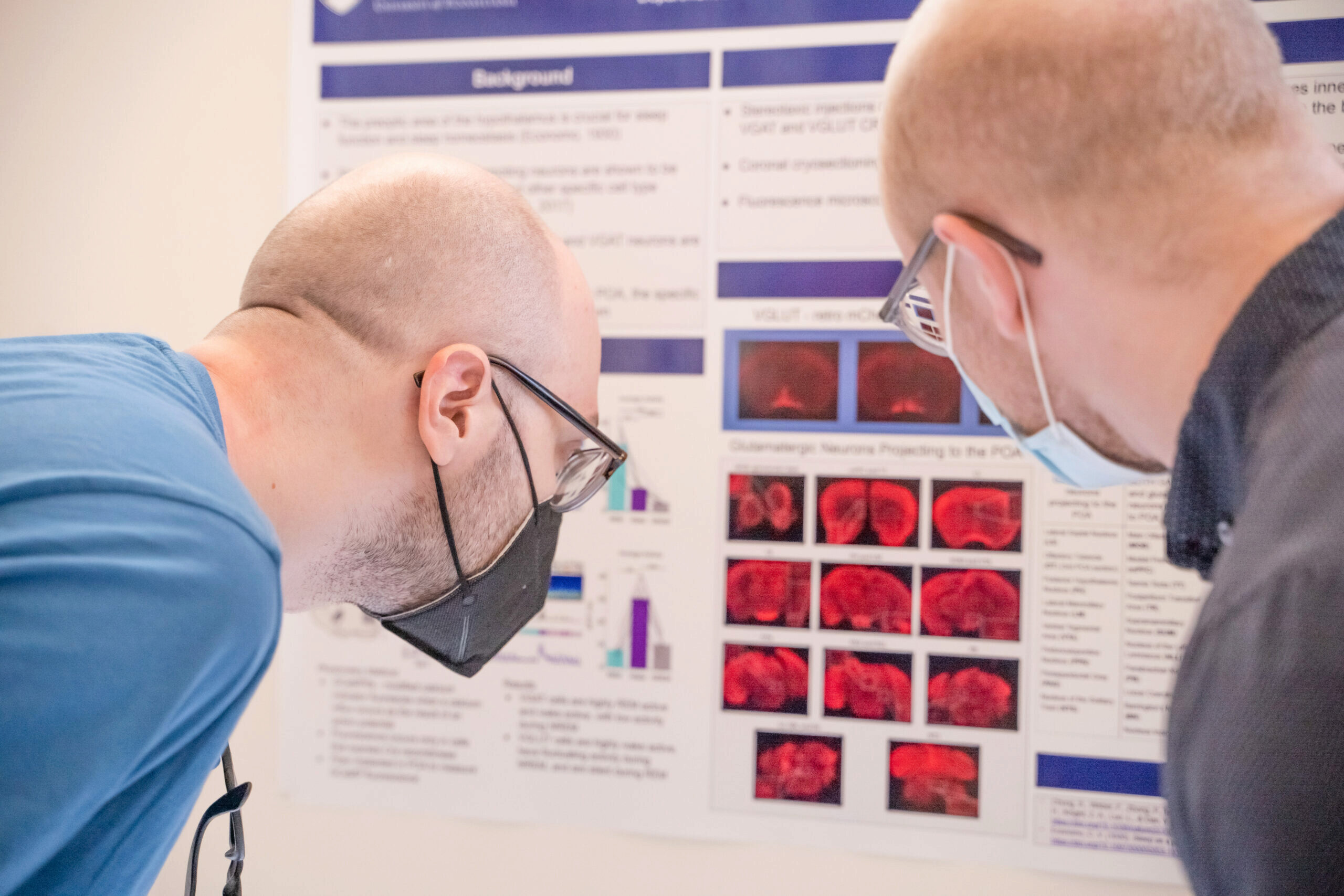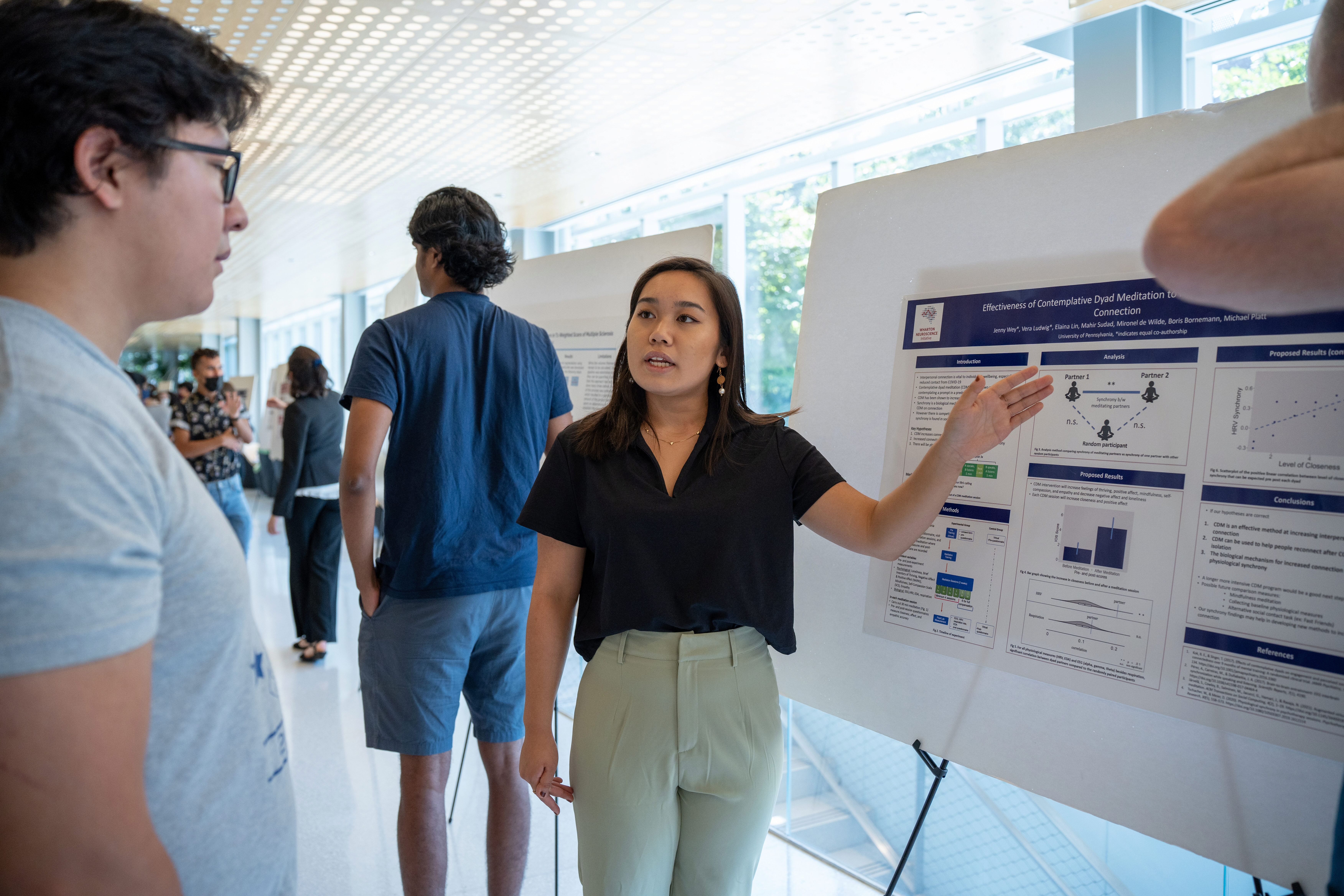News
MindCORE Summer Fellowship Program Aims to Expand Opportunities in Neuroscience
The University has launched a multidisciplinary fellowship designed to introduce undergraduate students to opportunities in neuroscience, behavioral science, analytics, and data science. The MindCORE Summer Fellowship is a paid, 10-week program open to Penn and non-Penn undergrads who partner with mentors to embark on a unique research project based on their own interests.
This summer, 23 fellows from across the country gathered on Penn’s campus to attend seminars, train in the lab, and soak up knowledge from professors and researchers who work across Penn, the Wharton School, the Wharton Neuroscience Initiative (WiN), and Wharton AI & Analytics Initiative (WAIAI).
“The application of neuroscience to business and business analytics is so new that…it hasn’t been diversified yet, so I think that we’re doing something really important, especially because the combination of high-level neuroscience and high-level business is not represented at most colleges in the United States,” said professor Michael Platt, who is the founding faculty director of WiN. “In some ways, you can’t be it if you can’t see it. This is an opportunity for students to see something new and potentially be attracted to that pathway.”
To that end, WiN and WAIAI sponsored four students this summer with scholarships, setting them on tracks to study applied neuroscience and business analytics, specifically.

About MindCORE
MindCORE (Mind Center for Outreach, Research, and Education) is Penn’s hub for the integrative study of the mind. Designed to unite researchers, programs, and initiatives involving human intelligence and behavior across the University, and with roots in the success of the former Institute for Research in Cognitive Science, MindCORE officially launched January 2018.
“One of the things that WiN really wanted to do was to create a pipeline of awareness, especially for students at the beginning of their undergraduate education…about what’s possible,” said Zab Johnson, managing director of WiN. “Often times, [students] don’t know how to even break into applied data science fields. What does it really mean to do this intersection between business and neuroscience? What are the kinds of jobs that might be available to them? We’re really trying to…create an awareness of the breadth of opportunities that actually exist.”
“In some ways, you can’t be it if you can’t see it. This is an opportunity for students to see something new and potentially be attracted to that pathway.”
– Michael Platt, Director, Wharton Neuroscience Initiative

With research covering everything from the neuroscience of teamwork, economic decision-making, and behavioral change communication strategies, to athlete information processing and the impact of dyad meditation on interpersonal connections, this summer’s projects were as varied and imaginative as the students who worked on them.
The meditation project was conceived by post-doc researcher Vera Ludwig, who left a lasting and positive impression on mentee and Pomona College junior, Jenny Wey.
“It was really cool having a…woman mentor because she inspired me to dream bigger for myself. She gave me a lot of liberty and freedom to prove to her and to myself that I could be a capable member of her team and meaningfully contribute,” said Wey. “Because of that, she helped me get other opportunities outside of academia and really encouraged me to look at nontraditional ways to get where I want to go.”

Wey, who majors in psychological science, said it was challenging to design the study protocols and learn how to work with biometric equipment, something she had never done before. Like many of the students, she was unable to complete her research during the short time of the fellowship, but she’s continuing some of the work back home.
For many of the fellows, the time spent in lab either confirmed their desire to become a research scientist – or not.
“I figured out that I want more hands-on work with patients,” said Carlos Santana, a sophomore who also attends Pomona College. “Even though I might stray away from the research field, I learned so much about the program and a bunch of life skills in the lab.”
The summer fellowship culminates in a poster session where the participants get together to share their work in a large one-page printed format. Heather Calvert, executive director of MindCORE, describes it as “a science fair for adults.” Although it seems like fun, the session is serious business; it offers practice for real-world presentations. Students have just one minute to explain their research, a timeframe that Calvert joked most professors can’t stick to.
“Talking about science is something that a lot of people don’t do very well,” she said. “I was incredibly blown away. They really did a good job. It was interesting to see just the wide variety of work that was going on in labs across campus.”
Meet the 2022 Scholarship Recipients
Renée Creppy
Jenny Wey
Christian Burrell
Carlos Santana
Wharton Neuroscience Initiative
The Wharton Neuroscience Initiative is a community of faculty, undergraduates, graduate and professional students, and staff interested in connecting brain science and business. They believe new neuroscience areas of exploration can be translated to improve business, drive new discoveries and applications, and enhance the education of future leaders at the nexus of business and brain science.


